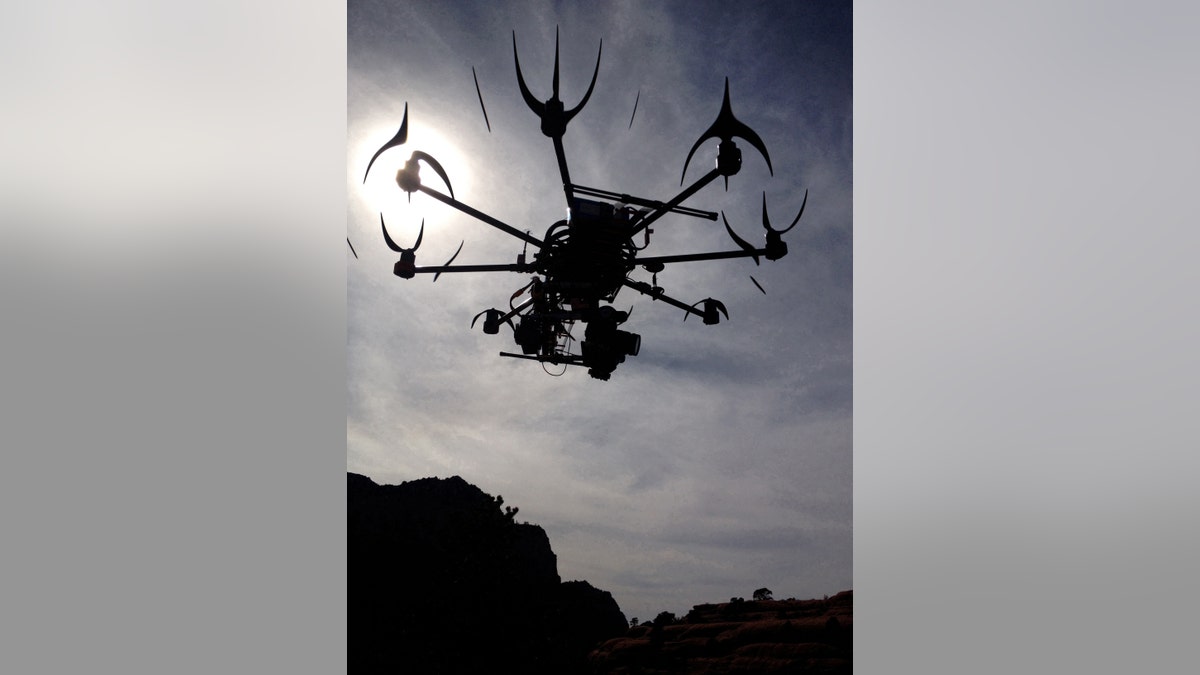
File photo - This image provided by Aerial MOB, LLC, shows their eight rotor Sky Jib Helicopter in San Diego, Calif., in August 2013. (AP Photo/Aerial MOB, LLC, Tony Carmean)
Just when you think you've seen the wildest story about drones (like that kid who strapped a handgun to one), something even crazier always seems to be just around the corner. Well today we've reached that corner, as a recent bill amendment in North Dakota officially legalized police use of armed drones anywhere within the state. This is no joke. Cops in North Dakota now have the legal ability to tase lawbreakers with unmanned aircrafts.
The fact North Dakota's new amended bill grants military-grade tech access to police officers is definitely a bit unnerving. If you can believe it, the originally proposed bill -- drafted by Representative Rick Becker as HB 1328 -- actually called for a complete ban on any weaponization of drones. Though its primary intent dealt with requiring police to obtain judge-issued search warrants before using a drone on criminal evidence, Becker also wanted to make sure no drones could ever be weaponized.
"In my opinion there should be a nice, red line: Drones should not be weaponized. Period," Becker stated at a hearing back in March.
After the state officially signed Becker's original bill into law back in April, the state house committee then allowed North Dakota Peace Officer's Association lobbyist Bruce Burkett to amend HB 1328. Burkett's amendment reversed the original bill's course on outlawing the weaponization of drones, instead changing the bill's language to allow drones to carry "less than lethal" weapons. Essentially, the term "less than lethal" weapons extends to rubber bullets, tear gas, tasers, sound cannons, and pepper spray. In a report done by the Daily Beast, author Justin Glawe references a statistic from The Guardian saying "at least 39 people have been killed by police tasers in 2015, so far." It goes without saying some of those "less than lethal" means are a bit more deadly than they let on.
Related: Boeing’s latest crazy patent? This drone that can transform into a submarine
There is a silver lining to all of this, however. Despite the new amendments, HB 1328 still requires police officers to document the reasons why/how often a department uses any drones, and requires records kept for up to five years. However, since the mandate took effect, the Federal Aviation Administration has reported a massive discrepancy concerning the records kept by the Grand Forks County Sheriff's Department. Despite said Sheriff's Department logging just 21 total drone missions between 2012 and 2014, the FAA itself documented roughly 401. Of course, Grand Forks Sheriff Bob Rost says the department isn't in the business of spying on people, but the discrepancy doesn't help much in proving his statement.
Though perhaps the single biggest reason Burkett and the Grand Forks Sheriff's Department fiercely back the bill's new amendment is the profit potential it has for the state of North Dakota. As Glawe points out in his reports, North Dakota consistently remains one of the states hit hardest by plummeting oil prices, inherently pushing the state to look elsewhere for economic growth. Due in large part to the massively growing drone industry, it seems only natural North Dakota would look to this developing field to help its economy flourish.
But then again, how successful might an economy be if your citizens flee in fear of being spied on by armed drones? Not very, we presume.
